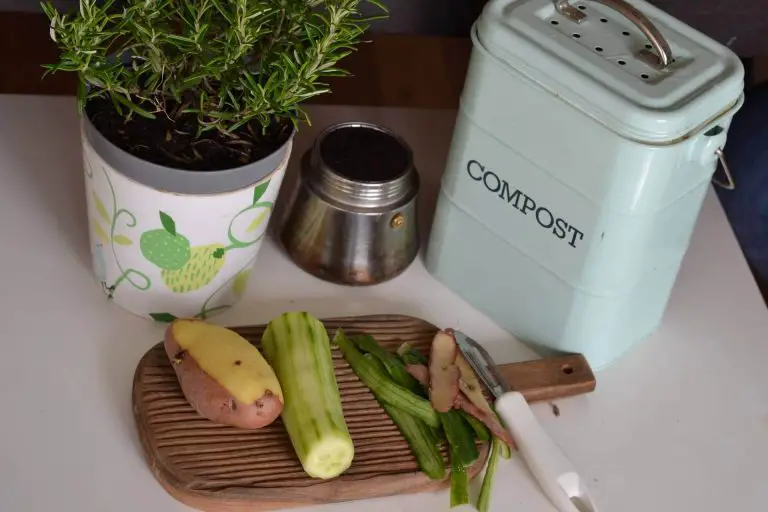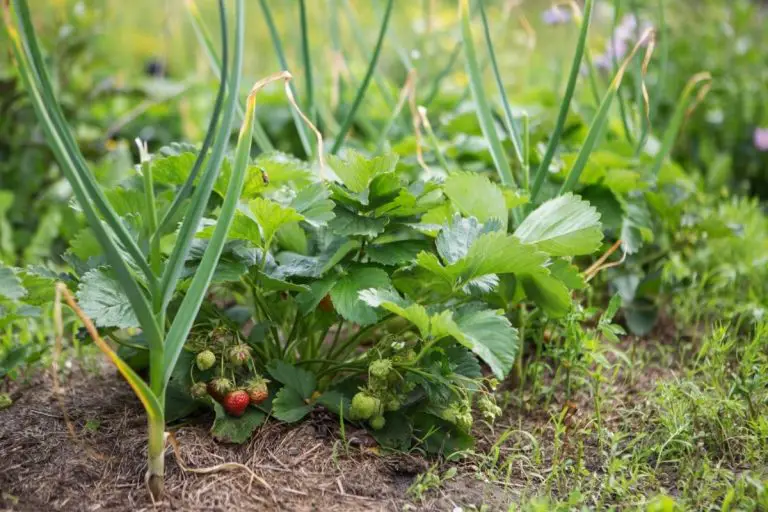Using Neem Oil For Tomatoes: The Ultimate Guide [2023]
Hey tomato growers! Are you keen to know why using neem oil for tomatoes is great for your money-making patch?
If your answer is YES, then keep on reading.
What is this neem oil many are raving about? Neem oil is oil derived through cold-pressing leaves and seeds of Azadirachta Indica or commonly known as the Indian Lilac tree.
It’s grown in tropical or semi-tropical climates like India and Africa. It contains a compound such as Azadirachtin that repels insects.
Bingo! Neem oil is an organic pesticide and fertilizer when applied correctly will help keep your tomatoes thriving and plump for harvesting.
I will cover many grounds today from safety concerns about using neem oil, the benefits of neem oil, how to mix neem oil for plants, and many burning questions about neem oil. This is to help you feel assured and confident when using neem oil on tomato plants afterward.
I too was unsure about neem oil on vegetables but after using it, I have not looked back!
Let’s dig into it.
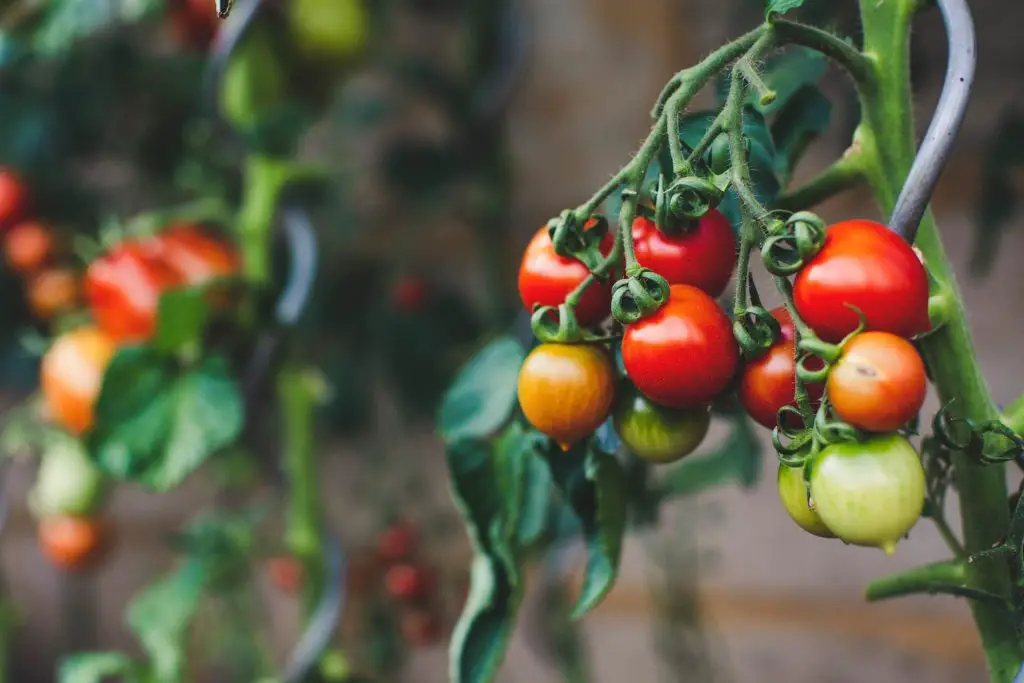
At A Glance: Neem Oil For Tomatoes
- Is Neem Oil Safe For Tomatoes?
- How Do You Apply Neem Oil To Tomato Plants?
- How Can I Use Neem Cake As Fertilizer?
- What Plants Should You Not Use Neem Oil On?
- Can You Eat Vegetables After Spraying Neem Oil?
- How Long Is Neem Oil Effective?
- Does Neem Oil Affect the Taste Of Vegetables?
- Which Method Of Using Neem Oil Works Best For Tomatoes?
Affiliate Link Disclosure
This post may contain affiliate links, meaning I get a commission if you decide to make a purchase through my links, at no extra cost to you.
Related Posts
- What Is Eating My Tomatoes? [And How To Fix It!]
- How To Grow Moneymaker Tomatoes + Tips To Grow Faster! [2022]
- How To Grow Tomatoes From A Supermarket A Supermarket: My Step-By-Step Guide
Is Neem Oil Safe For Tomatoes?
Neem oil is harmless when humans and pets consume it in small amounts because it is non-toxic. Hence, using neem oil for tomato plants is safe. Just ensure it is done 24 hours before harvesting tomatoes.

I recommend the easiest application using neem oil spray for tomato plants at dusk or dawn when pests and insects are active. The neem oil absorbed by the plant prevents insects from feeding, reduces mating, and terminates larvae from maturing.
Check the next to keep track of aphids, spider mites, and tomato hornworms infestation.
I used Bonide Captain Jack’s Neem Oil Ready-To-Use 3 in-1 Insecticide, Fungicide, and Miticide, For Organic Gardening and saw immediate results.
How Do You Apply Neem Oil To Tomato Plants?
1. Neem Oil Spray For Tomato Plants
Above I shared that the easiest way to apply is using neem oil spray for tomato plants. This is because cold-pressed pure neem oil needs to be diluted with other liquids too.
An alternative to buying ready-to-use spray is making your own neem oil spray mixture.
Below are the 3 easy steps to make neem oil spray:
1. Start by mixing ⅓ teaspoon of liquid dish soap with 1 quart of warm water followed by adding 1 teaspoon of cold-pressed raw neem oil.
Liquid dish soap is an important emulsifier and mixing it with water first helps oil and water to mix.
2. Fill the neem oil mixture into a garden spray and it is ready to use! Spray thoroughly into your tomato plants until it coats both the tops and bottoms of leaves.
3. Next, check again after 24 hours for effectiveness.
Do this treatment daily for 14 days to ensure the infestation is terminated.
I found this Ram-Pro Garden Spray Bottle super effective because of its safety valve and adjustable brass nozzle.
2. Neem Oil Soaks For Tomato Plants
Since mixing neem oil for plants is so easy, you will be happy to know there is another method to apply neem oil to tomato plants. The most effective method of using neem oil tomatoes is soaking the tomato plant soil with a neem oil mixture.
Below are 2 easy steps to make neem oil soaks:
1. Simply add 2 tablespoons of cold-pressed raw neem oil with 1 gallon of emulsified warm water.
2. Then, pour 2 to 3 cups of the mixture around the base of the tomato plant and let it soak into the roots.

This neem oil soil drench method allows the tomato plant roots to absorb and remain inside for up to 22 days. It deters pests from eating the tomato roots. I recommend repeating every 3 weeks to remain effective throughout the growing period as prevention.
I have tried a few cold-pressed raw neem oils to make my mixture, Harris Neem Oil 100% Cold Pressed and Unrefined Concentrate is a repeated purchase.
How Can I Use Neem Cake As Fertilizer?
Neem cake is the by-product of extracting neem oil made from neem leaf, bark, and seeds. Neem cake contains high content of “Big 3” nutrients: nitrogen, phosphorus, and potassium.
When neem cake is mixed with soil, it enriches the soil and supports plant growth. It is best to use neem cake before planting when setting the soil for your tomato plant.
For every 100 square feet of soil, mix 2.5 to 5 lbs of neem cake into the top 3 inches of soil.
You can also sprinkle neem cake on the topsoil of growing tomato plants and evenly distribute it. Neem cake is commercially produced and comes with detailed instructions. So, make sure you read the application rates on the packaging.
I have used Down To Earth Organic Neem Seed Meal Fertilizer and can confirm it is one of the best in the market. Neem cake is a 2-in-1 product because it is an organic fertilizer and pesticide rolled into one.
What Plants Should You Not Use Neem Oil On?
I’ve been sharing how great neem oil is and its by-product, perhaps you’re wondering if it can be used for all plants. Based on my own experience unfortunately no.
This leads to the question: what plants not to use neem oil on?
Do not spray neem oil on herbs such as:
- Cilantro
- Basil
- Dill
- Oregano
- Parsley
- Thyme
- Caraway
- Marjoram
Additionally, plants with wispy or delicate leaves should be treated with care when spraying neem oil because it can cause foliage burns.
A few examples of such plants are:
- Arugula
- Kale
- Lettuce
- Peas
- Spinach
Talking about foliage burns, it is an oil after all. Therefore, always use the diluted mixture and spray it during dusk or dawn when the leaves are not getting direct heat. By the time the sun is up, the neem oil mixture would have dried.
Can You Eat Vegetables After Spraying Neem Oil?
Vegetables sprayed with neem oil mixture are safe to eat. Just like all harvested vegetables, you have to thoroughly wash them before consuming them.
Even though most of the neem oil that you sprayed has been absorbed by the tomato plants after 24 hours, it is just good hygiene practice in case there is unseen contamination from the surrounding.
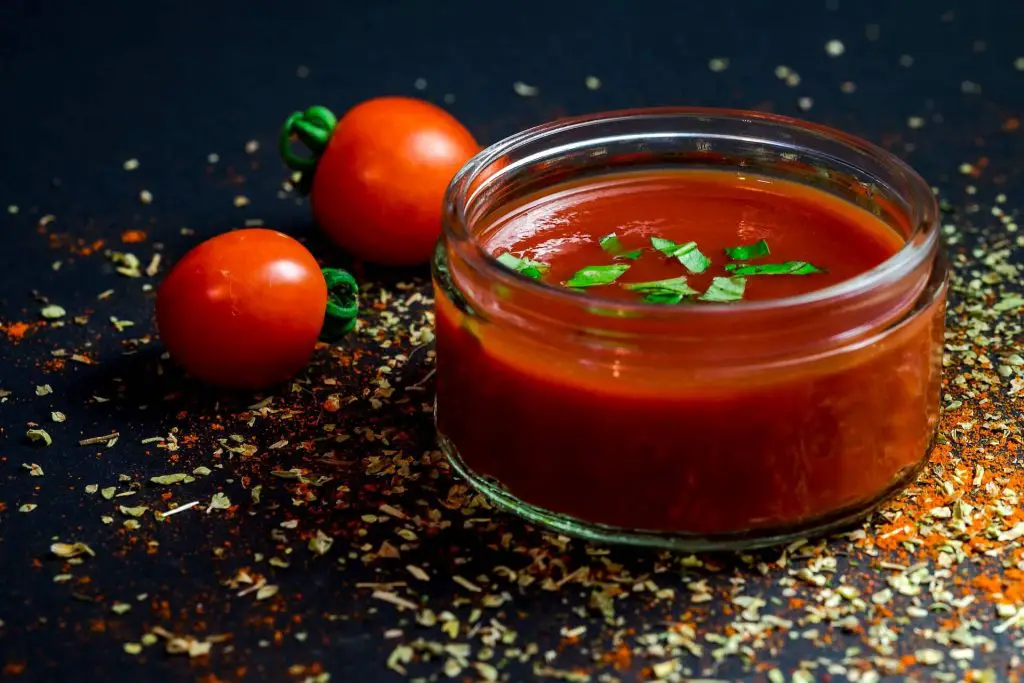
How Long Is Neem Oil Effective?
The self-made neem oil mixed with warm water and liquid soap will maintain maximum effectiveness for a few hours, hence I advised you to apply it daily for 14 days.
If you have excess, it is still usable for up to 3 to 4 days before its chemical compounds completely break down. Make sure to store it cool, away from direct sunlight, tightly sealed when not in use, and dry place.
The same goes for cold-pressed raw neem oil. The only difference it has a shelf life of 1 to 3 years.
Does Neem Oil Affect the Taste Of Vegetables?
While we are on the topic of eating tomatoes that were sprayed with neem oil, maybe it crossed your mind if neem oil affects the taste of vegetables.
For starters, neem oil has a sulfuric smell similar to garlic. Some people find it unpleasant.
Thus, neem oil can affect the taste of tomatoes but only slightly. Washing it thoroughly after harvesting helps lessen the taste. In fact, after a couple of weeks in the fridge, it disappears.
If you’re worried about this, I recommend mixing neem oil for plants on small separated patches. Treat it like an experiment.

Which Method Of Using Neem Oil Works Best For Tomatoes?
There is no one way to stick to when applying neem oil to your precious tomato plants. It boils down to the scenarios which you are in and your method of using neem oil for tomatoes.
The first one is taking immediate action to deter and terminate pests that have appeared on your tomato plants. That was the case for me. Using neem oil spray for tomato plants was super effective.
In the beginning, I didn’t make my neem oil mixture but started to because it was more cost-saving.
The second one is when the infestation has been terminated, I then transitioned to neem oil soil soaking to reduce daily spraying. The method of neem oil soil drench is only needed once every 3 weeks as a preventive measure.
Lastly, when I was exploring organic fertilizers, neem cake was commonly raved about and I decided to try it. Like I said in the intro, I’ve never looked back since!
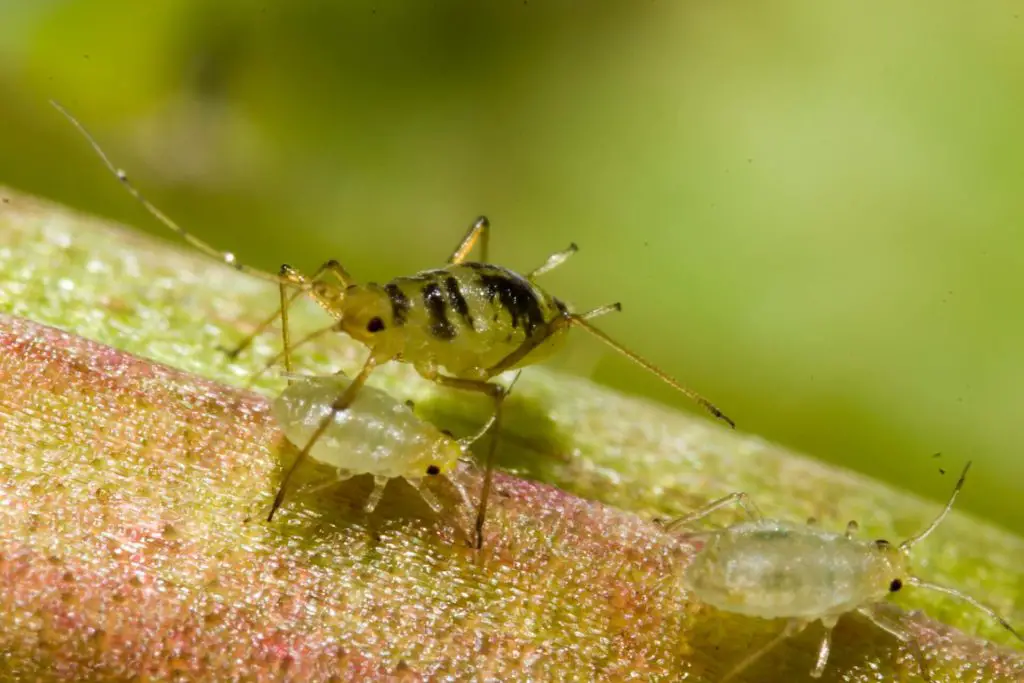
FAQs On Using Neem Oil For Tomatoes
Is Neem Oil Good For Tomato Blight?
Is neem oil good for tomato blight? Unfortunately, neem oil alone doesn’t stop tomato blight. Fortunately, neem oil tomato blight can be used as a preventive measure against the onset of tomato blight. During the earliest stage of infection, neem oil may kill the blight.
This is because tomato blight is caused by a fungus that spreads super fast throughout the plant causing decay. The fungus thrives in warm and wet weather.
Hence, solely using neem oil for tomato blight can’t stop it. You need to use a fungicide too.
Do I Need To Wipe Neem Oil Off Plants?
Are you wondering: do I need to wipe neem oil off plants? You do not need to wipe neem oil off the plant because it is an excellent pesticide, non-toxic and harmless.
After spraying neem oil thoroughly during peak pests activity, leave it for 24 hours for the plant to absorb the neem oil and terminate pests.
Does Neem Oil Get Rid Of Tomato Worms?
So, does neem oil get rid of tomato worms? Yes, it does! Neem oil deters arthropod pests that love to eat tomato plants like hornworms, corn earworms, aphids, and whiteflies. If you are facing a pesky situation, give neem oil spray or soak a try.
How Often Can I Spray Neem Oil On Tomato Plants?
If you are searching: how often can I spray neem oil on tomato plants? The answer is every 3 weeks for it to remain effective. Take note as well, at this point, it is just for preventive action and you are no longer battling a pest infestation.
If you have an infestation, spray neem oil daily for 14 days. The best time to spray neem oil is at dusk or dawn when pests are active.
What Happens If I Use Too Much Neem Oil?
Are you thinking: what happens if I use too much neem oil? Well, the leaves may burn if they are getting harsh direct sunlight for a long period during the day. This is due to the characteristics of oil that it reacts to high heat.
Thus, it is advisable to spray neem oil on tomato plants at dusk or dawn when the temperature is low and lesser harsh sunlight.

Now that we have covered all grounds on the goodness of neem oil for tomatoes, I hope you feel more confident to use it. How could you not try it after knowing the benefits it brings to your crop and its surrounding?
In conclusion, start with a small batch with the neem oil spray and then move to neem oil soak when you see the results intended. This way it will help with cost saving by not purchasing bigger size concentrated neem oil.
Whether you are growing tomatoes for your consumption or selling them, we should do our part to adopt sustainable and eco-friendly methods of growing.
I truly believe that since the earth has blessed us with bountiful healthy food, we need to make efforts to keep it healthy and thriving! Don’t you?
If you have any questions related to neem oil, do share them with me.
Related Posts






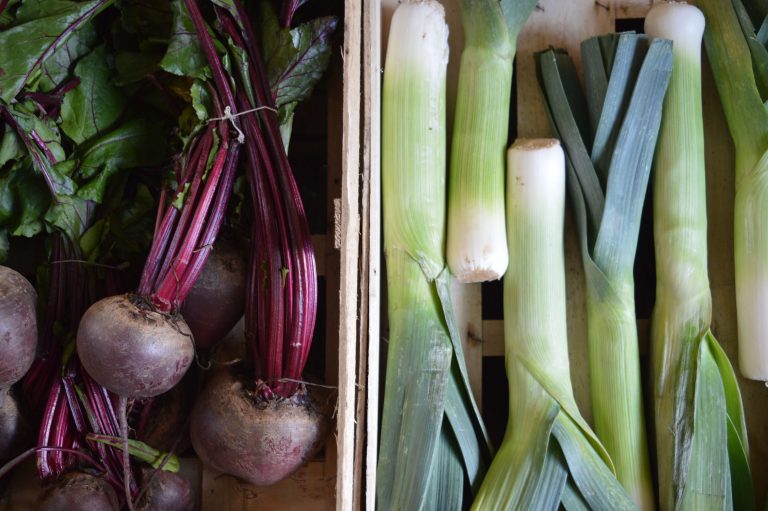
![Turmeric Companion Plants: 9 Plants to Boost Growth! [2023]](https://aboveandbeyondgardening.com/wp-content/uploads/2022/11/turmeric-companion-plants-768x512.jpg)
![11 Best Companion Plants For Oregano & What To Avoid! [2023]](https://aboveandbeyondgardening.com/wp-content/uploads/2022/11/companion-plants-for-oregano-768x512.jpg)
